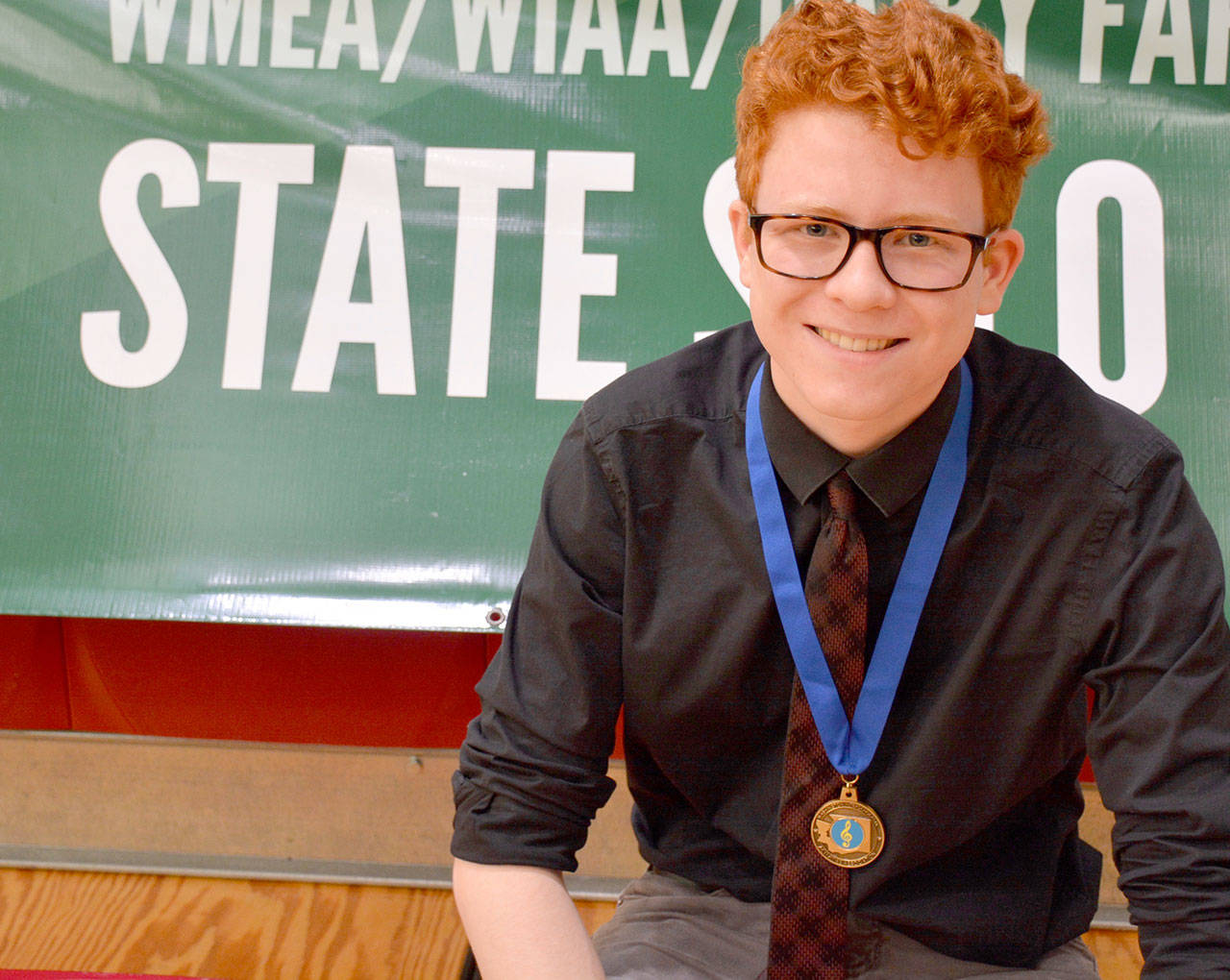Fourth time’s still charming for Bainbridge High School’s Henry Brown.
The skilled sax-playing senior recently nabbed top honors for the fourth consecutive year — taking first-place on alto saxophone — at the Washington Interscholastic Activities Association/Washington Music Educators Association’s State Solo and Ensemble Contest at Central Washington University in Ellensburg.
“This is Henry’s fourth state championship, and his first on alto saxophone,” said Christine Brown, his mother. “He won the tenor saxophone competition his sophomore and junior years, and the Small Woodwinds Ensemble category playing a saxophone duet with Kevin McCann his junior year.”
The feat is unprecedented for a Bainbridge High School student in recent memory.
For this year’s competition, Henry Brown chose Jacques Ibert’s “Concertino da Camera,” a piece he set as a goal back in his freshman year.
“His saxophone instructor, Dave Carson, says this is one of the most challenging pieces ever written for saxophone,” Christine Brown said. “The composition is usually played only by graduate student musicians at top universities. Henry earned unanimous superior ratings from the three judges at State.”
Several other Bainbridge High School musicians received top honors at the contest as well.
Matthew McCann, a sophomore, won second place on tenor saxophone, also earning unanimous superior ratings. He played “Improvisation et Caprice” by Eugene Bozza.
Megan Rideout-Redeker, a senior, earned a superior rating and won third place on bass clarinet for her performance of “Ballade” by Eugene Bozza.
Also competing at State were sophomore Nicolas Lofgren on clarinet, who earned unanimous superior ratings and honorable mention for his performance of “Concertino” by Carl Maria von Weber, and Sean Halstead, who played “Sonata in G Minor” by Henry Eccles on bass clarinet earning honorable mention.
Nicolas and Megan also competed as a duet in the Small Woodwinds Ensemble category, earning an honorable mention.
The competition to get to State is intense, said BHS band director Chris Thomas.
More than 5,000 soloists and 3,000 ensembles comprising 15,000-plus participants competed at the district level. Winners from each of Washington’s 22 regions then compete at the State competition before a panel of three adjudicators, and the top three in each category are honored at evening ceremonies.
“These students spend hundreds of hours, spread over several months, preparing for a single 10 minute-time slot that will determine whether or not they will earn the right to compete at the state level,” Thomas said. “Because of the nature of music competitions, this often means that these students are preparing all year to compete against some of their best friends, who often happen to play the same instruments. Typically, our students are able to handle this with grace and enthusiasm. This gives me great hope for our collective futures.”
In addition to participating in the BHS music program, Henry Brown, Matthew McCann and Megan Rideout-Redeker are students of Dave Carson, who has sent students to the State competition every year and has had someone place annually in the top three since 2003.
The four-time champ took time recently to chat with the Review about his awesome achievement, homework, rock climbing and what’s up next for the virtuoso Spartan.
BIR: Henry, how does it feel to be a four-time state champ?
HB: Since the start of high school, I set a goal to perform the “Concertino da Camera.” I enjoyed preparing and individualizing the song; it was well worth several months of work.
Winning four championships has been incredibly rewarding. The process drove me to study and improve, which augmented my enjoyment in playing music. You never really reach a destination in music, even with one piece or one genre. I’m closer than I’ve ever been, but I can look forward to much more in the future. Through my musical pursuits, I have met and played with many incredible musicians. I have been fortunate to study with Dave Carson since fifth grade.
BIR: What can you tell me about the piece you played? (I understand it’s notoriously difficult.)
HB: I performed movements I and II of “Concertino da Camera” by Jacques Ibert. The first movement and most of the second movement are played at a high tempo for classical music — they require precise and focused dynamics and articulation, as well as concrete timing with the piano accompaniment.
There are also several sections with altissimo in the piece that call for notes over an octave above the regular range of the saxophone. There has to be a strong balance between playing to the limit in difficulty and precision as well as performing artistically and meaningfully.
BIR: Tell me what a typical week of practice looks like for you — how much time do you put in, on how many days? Do you always practice at the same time/place?
HB: I will generally practice two to five hours in one session. I dedicate a lot of time to practicing, lessons, Jazz Band, Wind Ensemble, and many other music opportunities.
BIR: Who is your favorite saxophone player and why?
HB: Chris Potter. He is virtuosic and super versatile. He has a very unique style whether playing standards or his own modern tunes.
BIR: What’s next for you after graduation? Will you continue to study music, maybe pursue a professional career?
HB: Starting this fall, I will be in the honors program at the University of Washington. I plan to study Mechanical Engineering and Jazz Studies.
BIR: What do you like to do when you’re not doing homework and practicing? (Do you even have time for other hobbies?)
HB: I work at Island Rock Gym. I enjoy rock climbing and bicycling.
BIR: What was the last book you read that you really liked?
HB: “A Sense of the World: How a Blind Man became History’s Greatest Traveler” [by Jason Roberts].
BIR: You’re obviously a very dedicated, talented guy. Are there any personal “secrets for success” you care to share?
HB: Self-awareness. No matter how well you play, you should always be able to identify aspects to improve.



